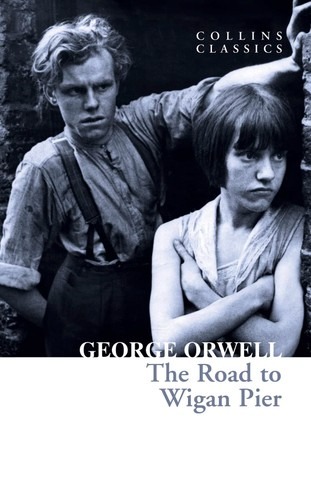The Road to Wigan Pier (Collins Classics)
700,00 د.ج
HarperCollins is proud to present its incredible range of best-loved, essential classics.
If there is one man to whom I do feel myself inferior, it is a coalminer.
In the mid-1930s, George Orwell was given an assignment from his publisher – to write a book about unemployment and social conditions in the economically depressed north of England. Revolutionary for its time, The Road to Wigan Pier documents Orwell’s stint in towns likes Barnsley, Sheffield and Wigan in 1936, where he met and observed working-class people living in the bleak industrial heartlands of Yorkshire and Lancashire.
Orwell graphically and emphatically describes the hardships of ordinary people living in cramped slum housing, working in dangerous mines and growing hungry through malnutrition and social injustice. It is an honest, gripping and humane study that also looks at socialism as a solution to the problems facing working-class northerners – something many readers at the time were uncomfortable discussing.
The Road to Wigan Pier cemented ideas that would be found in Orwell’s later works, and remains a powerful portrait of poverty, injustice and class divisions in Britain to this day.
HarperCollins is proud to present its incredible range of best-loved, essential classics.
If there is one man to whom I do feel myself inferior, it is a coalminer.
In the mid-1930s, George Orwell was given an assignment from his publisher – to write a book about unemployment and social conditions in the economically depressed north of England. Revolutionary for its time, The Road to Wigan Pier documents Orwell’s stint in towns likes Barnsley, Sheffield and Wigan in 1936, where he met and observed working-class people living in the bleak industrial heartlands of Yorkshire and Lancashire.
Orwell graphically and emphatically describes the hardships of ordinary people living in cramped slum housing, working in dangerous mines and growing hungry through malnutrition and social injustice. It is an honest, gripping and humane study that also looks at socialism as a solution to the problems facing working-class northerners – something many readers at the time were uncomfortable discussing.
The Road to Wigan Pier cemented ideas that would be found in Orwell’s later works, and remains a powerful portrait of poverty, injustice and class divisions in Britain to this day.
| Editeur |
|---|
Produits similaires
Why We Can’t Sleep: Women’s New Midlife Crisis
Calhoun decided to find some answers. She looked into housing costs, HR trends, credit card debt averages and divorce data. At every turn, she saw a pattern: sandwiched between the Boomers and the Millennials, Gen X women were facing new problems as they entered middle age, problems that were being largely overlooked.
Speaking with women across America about their experiences as the generation raised to 'have it all,' Calhoun found that most were exhausted, terrified about money, under-employed, and overwhelmed. Instead of their issues being heard, they were told instead to lean in, take 'me-time' or make a chore chart to get their lives and homes in order.
In Why We Can't Sleep, Calhoun opens up the cultural and political contexts of Gen X's predicament and offers solutions for how to pull oneself out of the abyss - and keep the next generation of women from falling in. The result is reassuring, empowering and essential reading for all middle-aged women, and anyone who hopes to understand them.
Dear Ijeawele, or a Feminist Manifesto in Fifteen Suggestions
A few years ago, Chimamanda Ngozi Adichie received a letter from a dear friend from childhood, asking how to raise her new baby girl a feminist.
Although she has written and spoken out widely about feminism, Adichie wasn't sure how to advise her friend Ijeawele. But as a person who'd babysat, had loved her nieces and nephews, and now, too, was the mother of a daughter herself, she thought she would try. So she sent Ijeawele a letter with some suggestions--15 in all--which she has now decided to share with the world.
Compelling, direct, wryly funny, and perceptive, Dear Ijeawele offers specifics on how we can empower our daughters to become strong, independent women. Here, too, are ways parents can raise their children--both sons and daughters--beyond a culture's limiting gender prescriptions. This short, sharp work rings out in Chimamanda's voice: infused with deep honesty, clarity, strength, and above all love. She speaks to the important work of raising a girl in today's world, and provides her readers with a clear proposal for inclusive, nuanced thinking. Here we have not only a rousing manifesto, but a powerful gift for all people invested in the idea of creating a just society--an endeavour now more urgent and important than ever.
Musicophilia: Tales of Music and the Brain
Ikigai: The Japanese secret to a long and happy life
The 48 Laws Of Power
Some laws teach the need for prudence ("Law 1: Never Outshine the Master"), the virtue of stealth ("Law 3: Conceal Your Intentions"), and many demand the total absence of mercy ("Law 15: Crush Your Enemy Totally"), but like it or not, all have applications in real life.
Illustrated through the tactics of Queen Elizabeth I, Henry Kissinger, P. T. Barnum, and other famous figures who have wielded--or been victimized by--power, these laws will fascinate any reader interested in gaining, observing, or defending against ultimate control.










